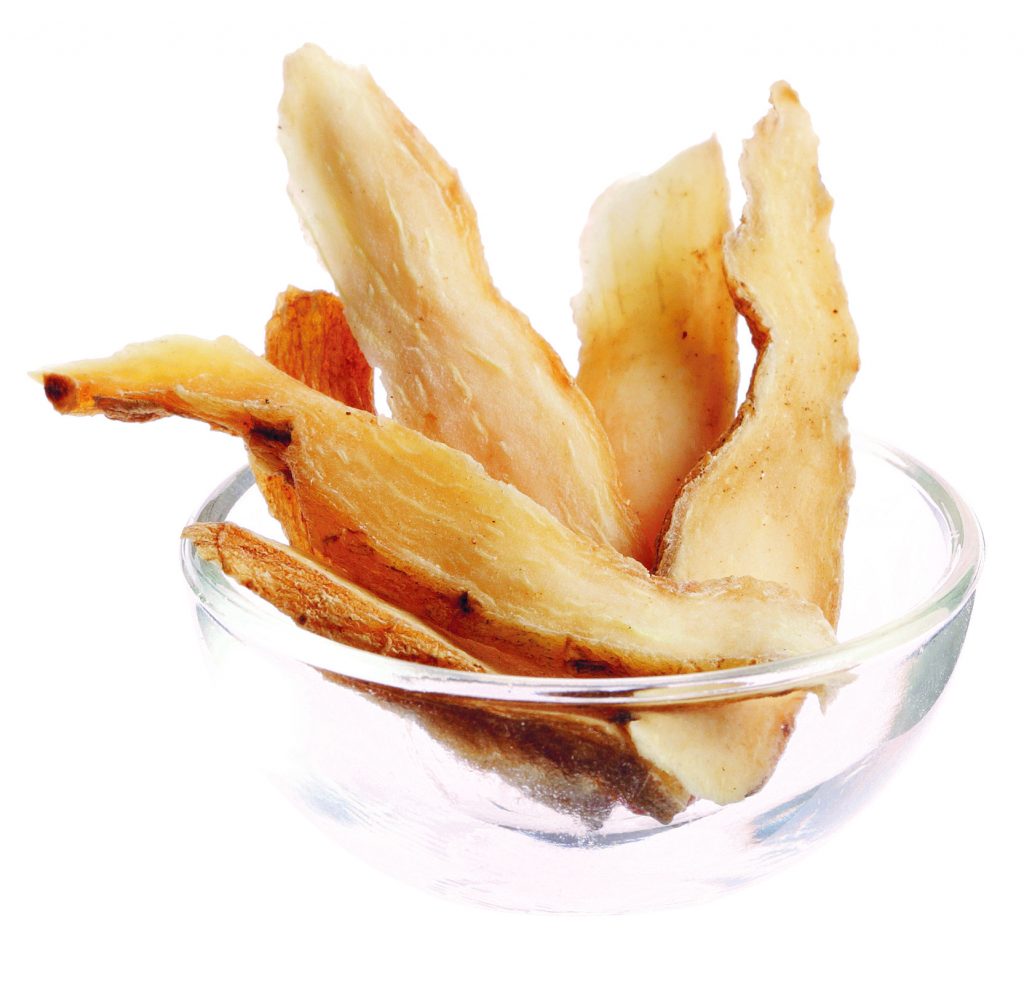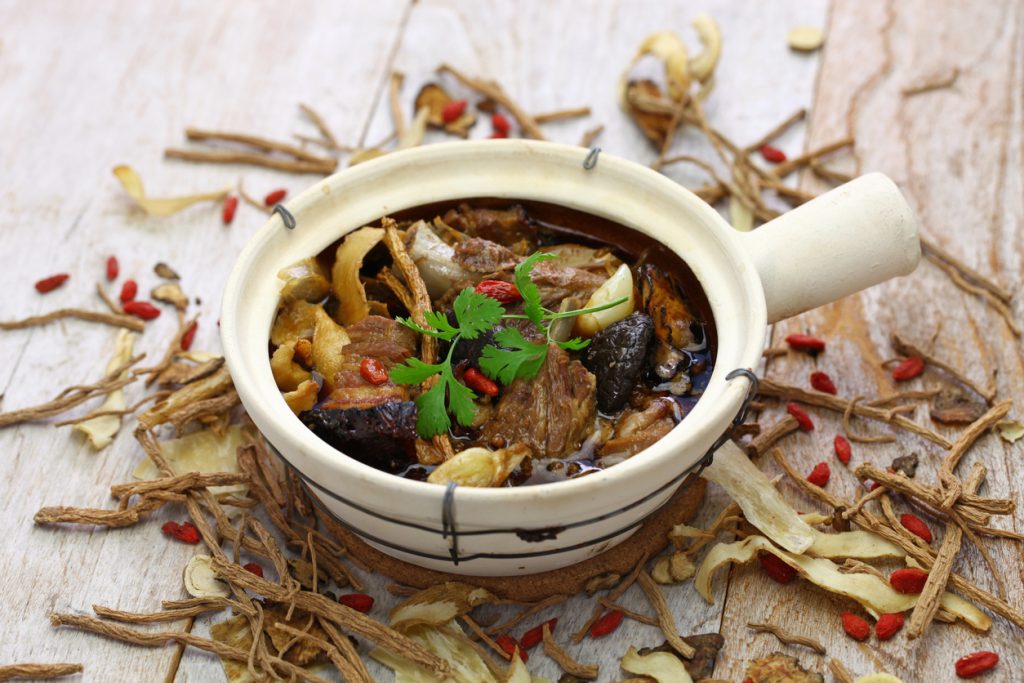Fragrant Solomonseal Rhizome (Solomon's Seal)

Fragrant Solomonseal Rhizome (Solomon's Seal)
Fragrant Solomonseal Rhizome (yu zhu, 玉竹), also known as Solomon’s Seal, is the dried edible rhizome of the Solomon Seal Plant, which belongs to the Lily family. Its Chinese Name Yu Zhu means Jade Bamboo, referring to its appearance as a long, fat, white-yellow coloured root.
In the wild, the herb thrives in the woodlands of China, the Himalayas and Siberia. However, this herb can be grown in shaded areas as decoration for its beautiful arching stems and hanging white flowers too. After being harvested in Autumn, Solomon’s Seal is then dried under the sun and sliced for future use.
In Traditional Chinese Medicine (TCM), Solomon’s Seal falls under the category of ‘Tonic herbs for Yin Deficiency’. This herb is usually used for patterns of Deficiency to replenish one’s ‘Four Treasures’ (qi, blood, yin, yang). Cold in nature, Solomon’s Seal can help individuals who have too much ‘Heat’ in their body, such as those who are experiencing a yang excess or a Yin Deficiency, to restore a healthy yin-yang balance.
Sweet in taste, Solomon’s Seal tends to slow down acute reactions and help to detoxify the body. Also, this herb has a tonic effect on the human body because it can replenish qi and blood. In particular, Solomon’s Seal targets the Lungs and the Stomach. While the Lungs are vital to the production of qi and body fluid that nourish the body, the Stomach is responsible for receiving and ripening ingested food and fluids. It also helps to descend the digested substances downwards to the Small Intestine.
Functions and Benefits of Fragrant Solomonseal Rhizome (Solomon's Seal)
Traditional Chinese Medicine (TCM) shows that Solomon’s Seal has 3 main functions:
Solomon’s Seal can nourish the yin in one’s Lungs to resolve syndromes caused by Yin Deficiency. For example, this herb is often used to relieve dry cough with little phlegm, cough with blood, hoarseness caused by Yin Deficiency and dryness in Lungs with heat. Also, the herb can help to clear Lung Heat.
Solomon’s Seal can nourish the yin in one’s Stomach to resolve syndromes caused by Yin Deficiency. This herb can promote the production of body fluid, clear Stomach Heat, relieve thirst, hunger with no appetite, dry stool, no coating or red tongue with little fluid, stomachache, distending in stomach, retching, and other symptoms caused by Stomach Yin Deficiency.
Solomon’s Seal can extinguish Wind from the body and soften Sinews. Hence, this herb is often used to relieve pain and spasms in the sinews caused by Wind generated by Deficiency in body fluid. It is also used to reduce dizziness caused by internal Wind.
Other than the above Solomon’s seal benefits, modern studies also showed that Yu Zhu can provide a range of beauty benefits. It can tones and moisturises skin, reduces dark spots, whitens complexion, heals acne, reduces pus formation and prevents enlargement of skin vessels. Also, Solomon’s Seal can help to fight signs of ageing, promote weight loss, reduce hair fall and promote hair health.
Solomon’s Seal can also help to regulate our blood pressure, blood sugar levels and cholesterol levels. Other than that, the herb also helps to rebuild damaged cartilage and connecting tissues, reduces inflammation, accelerates the healing of bruises and wounds, and promotes quicker recovery from bone injuries.
Solomon’s Seal is a great herb when it comes to providing relief from painful menstrual cramps, as well as calming the mind and relieve restlessness.

How to Use Fragrant Solomonseal Rhizome (Solomon's Seal)
Solomon’s Seal is most often used to make herbal soup, concoctions, dishes or herbal tea (e.g Solomon’s Seal tea). Sometimes, the herb is also available in forms such as extracts.
This dry herb can be easily found in herbal stores and the dry food section of supermarkets.
When choosing Solomon’s Seal, look out for the ones that are soft, long, thick and yellowish white in colour. Avoid the ones that have been bleached white. Also, Solomon’s Seal of superior quality are usually large, fleshy and semi-transparent.
Despite its thin shape, Solomon’s Seal requires a rather long cooking time of more than two hours to be cooked. Before cooking it, remember to rinse Solomon’s Seal in cool water and soak it for 10 minutes. Adding Solomon’s Seal to soups can sweeten the soup and balance out its heatiness.

Cautions and Side Effects of Fragrant Solomonseal Rhizome (Solomon's Seal)
According to TCM, Solomon’s Seal should not be used by individuals who are experiencing Spleen deficiency or Cold Damp Phlegm.
Also, the recommended dosage of Solomon’s Seal to be consumed per day is 6-12g. Remember to use this herb in moderation as overdosing may lead to mild nausea, vomiting or diarrhea.
Summary
Here is a summary for Fragrant Solomonseal Rhizome (Solomon’s Seal):
- Herb name (Chinese): 玉竹
- Herb name (Pin Yin): yù zhú
- Herb name (English): Fragrant Solomonseal Rhizome
- Herb name (Botanical): Rhizoma Polygonati Odorati
- Origin of species: Polygonatum odoratum (Mill.) Druce
- Part(s) of herb used: Rhizome
- Geo-specific habitat(s): Hunan, Henan, Jiangsu
- Taste(s) & Properties: Sweet; Slightly cold; Administrates the Lung and Stomach meridians
- Actions: Ideal for individuals with chronic respiratory ailments; Eases symptoms of common thirst, dry mouth, bad breath, and reduced appetite; Calms the mind to relieve restlessness.
References
Liu, H., Qiu, N., Ding, H., & Yao, R. (2008). Polyphenols contents and antioxidant capacity of 68 Chinese herbals suitable for medical or food uses. Food Research International, 41(4), 363-370. [Accessed on 25th September 2022]
Weng, W., & Chen, J. (1996). The eastern perspective on functional foods based on traditional Chinese medicine. Nutrition reviews, 54(11), S11. [Accessed on 25th September 2022]
Share this article on
